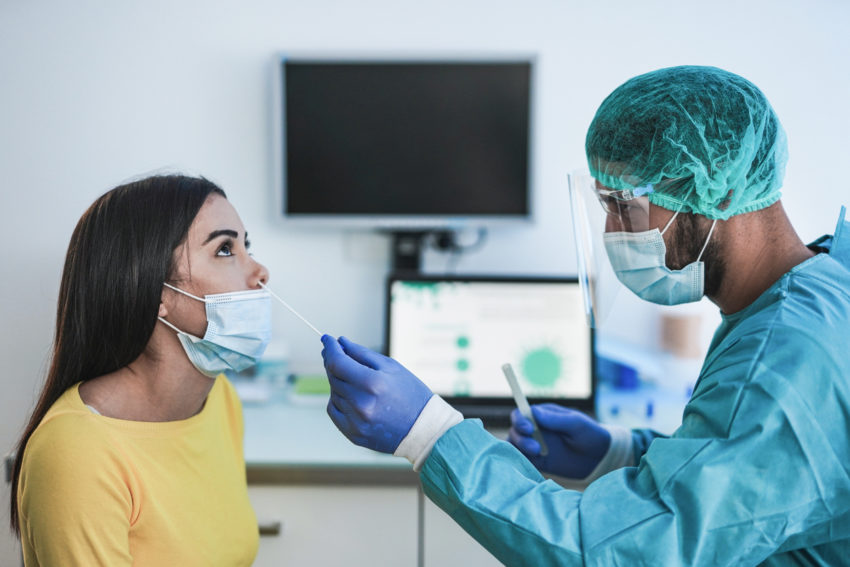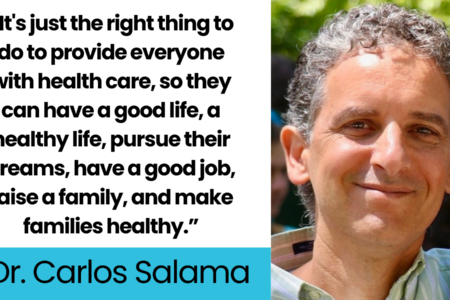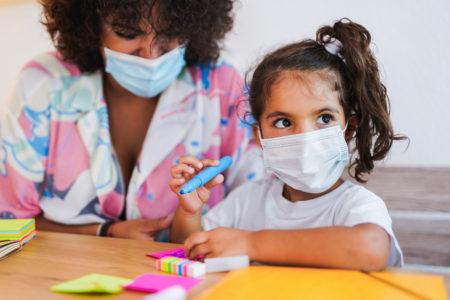
Share On Social!
A new strain of the COVID-19 virus is spreading, and the Omicron variant has already reached North America, experts say.
This is yet another mutation, following the Delta variant, that was first identified in South African researchers. It has quickly spread to other continents.
Health experts, such as former FDA Commissioner Dr. Scott Gottlieb, urge people to not get over-worried too quickly about Omicron, but still take available precautions like getting the COVID-19 vaccine and booster shot.
“Is this making people more ill? There’s no indication that it is. And in fact, there’s some anecdotal information offered from physicians in South Africa that this could be causing milder illness. Now, that could be an artifact of the fact that initial cases seem to be clustered in younger people, perhaps in outbreaks around universities,” Gottlieb said.
How will this variant impact Latinos? Let’s explore what we know so far.
The Omicron Variant of COVID-19 and Its Spread
The Delta variant still makes up 99.9% of COVID-19 cases in the U.S., according to CDC data.
But on Nov. 26, 2021, experts at the World Health Organization classified Omicron as a “variant of concern.”
No cases of the variant have been identified in the U.S. to date, according to the CDC, which is monitoring the spread closely. They also are increasing surveillance for the disease in travelers at four major airports.
This strain has some scientists concerned, as it has shown to mutate more quickly than previous strains, making it more transmittable.
It has cropped up in 20 countries already, including reported cases in:
- Britain
- Italy
- Belgium
- The Netherlands
- Canada
One concern is whether the COVID-19 vaccine will be effective.
One expert, Dr. Peter Hotez, the co-director of the Center for Vaccine Development at Texas Children’s Hospital, says not to panic.
“It will almost certainly not be as susceptible to the original vaccinations as the original strains, but we’ve seen this before,” Hotez said on The Daily Show. “There was enough crossover from our existing vaccinations to partially cross neutralize it. My hope is that’s the case with the current vaccines.”
The biggest take away here, according to the experts, is the understanding that it will take some time to discover more about the Omicron variant.
“[U.S. health officials] have a number of patients that they’re following in the medical facilities, and they assured us that they would know probably in a matter of a week, a week and a half, as to whether or not we’re dealing with something that, for the most part is more severe, equally as severe or less severe. It could be either of them,” Dr. Anthony Fauci, Chief Medical Advisor to the President of United States said.
For now, the best thing to do is practice precautions and get the vaccine booster shot when it comes to COVID-19, whether the Omicron, Delta, or other emerging strain.
“Today, CDC is strengthening its recommendation on booster doses for individuals who are 18 years and older,” CDC Director Dr. Rochelle Walensky said in a statement on Nov. 29, 2021, according to CNN.
“The recent emergence of the Omicron variant (B.1.1.529) further emphasizes the importance of vaccination, boosters, and prevention efforts needed to protect against COVID-19.”
Vaccines as a Key Way to Stop the Spread of COVID-19 and Variants like Omicron
As the world continues to navigate the COVID-19 pandemic, especially against new variants like Omicron, it’s up to each of us to keep our families and communities safe.
One thing we can all do is get vaccinated against COVID-19.
Is anyone you know still unsure about the vaccine?
To help move Latinos from vaccine hesitancy to vaccine confidence, Salud America! at UT Health San Antonio is uplifting the stories of real Latinos who overcame misinformation, got the COVID-19 vaccine, reconnected with family, and are helping end the pandemic.
Share these “change of heart” vaccine heroes in English or Spanish!
Like Rosa Herrera. She read on Facebook that the vaccine would inject her with a microchip.
What changed her heart? After doing research and learning that the vaccine is safe, she ultimately decided to get the vaccine. She’s glad she did.
“I’m able to see my grandkids and my kids here. It gives you more freedom,” Herrera said.
Find COVID-19 vaccine locations near you in English or Spanish!
Practical Precautions as a Key Way to Stop the Spread of COVID-19 and Variants like Omicron
You can also make sure to continue practicing safety precautions, no matter your vaccination status. The CDC recommends that everyone continue to wear masks indoors, as of July 27, 2021.
- Wear a face mask—and care for it properly.
- Avoid public places, or at least get together safely.
- Know what to do if you’re exposed or test positive.
Check out the “Juntos, We Can Stop COVID-19” digital communication campaign from Salud America! at UT Health San Antonio. This campaign aims to help Latino families and workers slow the spread of COVID-19.
The #JuntosStopCovid campaign features culturally relevant fact sheets, infographics, and video role model stories to encourage Latinos to change their public health behaviors.
share the campaign in ENGLISH!
share the campaign in SPANISH!
By The Numbers
142
Percent
Expected rise in Latino cancer cases in coming years




[…] The pandemic is another chapter in the bitter story of American racism and inequality. Black and Latinx people are being infected and are dying at much higher rates than white Americans. Many people of […]
[…] coronavirus has killed over 61,000 Latinos in America according to the CDC, accounting for over 18.2% of the total COVID deaths in the […]
[…] Whereas Hispanics make up 11% of D.C.’s inhabitants, they signify 19% of the COVID cases, and 14% of the deaths. Equally, 46% of D.C.’s residents are Black, they usually make up an alarming 75% […]
[…] and historical mistreatment. According to the U.S. Centers for Disease Control and Prevention, Latino and Black American communities are three times more likely to become infected with […]
[…] Covid pandemic has hit the Latino community particularly hard, and data from the nonprofit health equity advocacy group Salud America! shows Latinos lead in the 0-24 age […]
[…] the pandemic, Latinos took major blows, both in terms of COVID-19 cases and also from the economic recession under former President Donald Trump. Nearly half (49%) of […]
[…] the positive trend, the harm may have already been done. The pandemic has disproportionately impacted Latino communities. Reuters reported that election-related or political disinformation that […]
[…] pesar de la tendencia positiva, es posible que el daño ya esté hecho. La pandemia ha impactado desproporcionadamente Comunidades latinas. Reuters informó que la desinformación política o relacionada con las […]
[…] residentes blancos muestran una tasa mucho más baja con 10 muertes por cada 100,000 habitantes(8 9) . Los afroestadounidenses por su parte, denuncian subsistemas de salud que les segregan […]
[…] https://salud-america.org/coronavirus-case-rates-and-death-rates-for-latinos-in-the-united-states/ […]
[…] https://salud-america.org/coronavirus-case-rates-and-death-rates-for-latinos-in-the-united-states/ […]
[…] communities have the second-highest number of COVID-19 cases in the U.S. They’re also more likely to become hospitalized and die from the disease than other […]
[…] total, around 160,000 Latinos were killed by COVID-19. This accounts for 16% of the 1 million deaths in the country. The […]